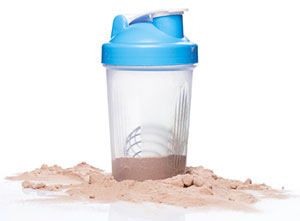As bariatric patients, we need to track a metric ton of information daily – exercise, weight, portions, carbs, fats, inches, vitamins, calcium and more – but we live and die by two numbers in particular: fluids and protein. Deficiencies in either will almost certainly put you back in the hospital or, at the very least, make your recovery and ongoing weight loss much more difficult than it has to be.
Fluids are pretty straight ahead – aim for 64 ounces a day, no carbonation, no sugary drinks, and no alcohol. Protein, though, is an entirely different matter. Way more moving parts, so to speak.
Surprisingly, there have been relatively few studies on protein intake recommendations for bariatric patients, comparatively speaking, but the material that is out there is clear: many, perhaps even most, bariatric patients don’t get enough.
Not good, people. Not good.
Why Protein is Important for Bariatric Surgery Patients
Protein is essential to life; your muscles, your organs and your immune system all require protein to do their jobs. Proteins carry the oxygen around your body. Proteins perform the chemical reactions that control how we think, feel, and react. They protect us from disease, and they are quite literally the reason we can move around in this great, big world of sound and color, day and night.
Come up short consistently on your protein daily requirement and you’ll start to feel it.
A deficiency of protein can cause hair loss, bad skin, bad nails, and worse. The absence of key proteins may even be linked to the onset of diseases like Multiple Sclerosis that can lay dormant for years until they flare up painfully and unexpectedly.
How Much Protein Should You Get?
So, how much protein is enough? If you’re a bariatric patient, you know the deal: at least 60 grams of protein. Every day. Come rain or shine, hell or high water. Sixty grams.
Some bariatric programs may advise you to get more than 60 grams of protein per day. Always follow your doctor’s or nutritionist’s guidelines.
You heard it in Bariatric Class pre-op and you heard it again post-op; odds are, every time you check in with anyone involved in your surgery, you’ve heard it. Again. And again. And again.
But here’s the thing. This 60 g’s number’s got some actual science behind it. Whodathunkit?
The rule of thumb, medical researchers say, is .8 grams of protein for every kilo of body weight. If you want that in normal, American numbers, multiply your weight by .36, and there ya go.
Bear in mind, though, we’re talking kilo of ideal, not current, body weight. When I ran the numbers using my starting weight, (SW: 337 CW: 236 GW: 190) I got an RDA of 124 grams of protein. Turns out, when I run the numbers on a figure that puts me in the high end of a normal BMI, my RDA for protein is … 62.
All right, 60 grams it is. The question, then, is how to get?

How to Get Enough Protein?
For a lot of us, getting 60 g’s of protein was hard before bariatric surgery. After bariatric surgery our physical capacity to take in food is extremely limited — admittedly, kinda the point of bariatric surgery, duh, but worth restating, indeed, celebrating every now and then — and restrictions around the timing of food and drink don’t exactly make things any easier.
And then there’s the GERD. Heartburn. Acid reflux. Whatever you want to call it.
The point is, getting to the protein promised land ain’t easy, and we all have to find our own path to protein peace and prosperity. But find it we must.
For me, it’s the protein supplement.
It comes in many different forms. Whey. Soy. Casein. Isolate. Concentrate. Powders. Liquids. Gels. Shakes, pre-mixed and ready to drink for your new, fast-paced, on-the-go lifestyle, or powdered for home use. The choices are endless. Whey protein isolate is the preferred type of protein for bariatric patients because it is the easiest to digest. Most bariatric-specific protein shakes will be 100% whey isolate or primarily whey protein.
I’ve come to depend on the shakes because they’re twofers; not only do they deliver a power-packed, protein punch on demand — as much as 30 grams (half my daily nut!) — they also count as fluids in my ongoing pursuit of 64 ounces per day. Suddenly it’s a lot easier for me to get in that 30 grams over the course of a day. Your results may differ.
 Curiously, in the weeks and months after my surgery, as I moved through the recovery protocol, I somehow arrived at the view that I would never be completely “recovered” until I got off the protein supplements and was getting everything I needed from “real” food. Which probably says more about my relationship with food than anything else, but there we are.
Curiously, in the weeks and months after my surgery, as I moved through the recovery protocol, I somehow arrived at the view that I would never be completely “recovered” until I got off the protein supplements and was getting everything I needed from “real” food. Which probably says more about my relationship with food than anything else, but there we are.
I brought this up in one of my post-op meet-and-greets with my surgeon, and he schooled me.
There’s no shame in the protein supplement, he said, no shame at all. Are we ashamed of our vitamin supplements? No. Do we skulk around in the shadows with our calcium? No. No, we don’t. Why, then, should we be ashamed of our protein supplements?
It’s all good, and if it’s working for you, don’t worry about it, he said, adding, almost as an afterthought, that I’d probably be using protein supplements in some form or another for the rest of my life.
So I got that going for me, which is nice.
Where to Get Bariatric Protein Supplements?
Your doctor may sell them at his or her office. They often have free samples. Tastes vary and you may need to try multiple options before you find one that you like. Genepro makes a truly tasteless protein powder that can be added to food. Nectar is known for its delicious flavor options. Starting with a sample pack is the best way to find a flavor you like. Online stores offer sample packs.
Conclusion
Protein is a building block required for your muscles, immune system and internal organs to function properly. Protein also helps you stay full longer.
- When you sit down at the table for a meal, eat your protein first, then your veggie and then (if you have room) a complex carbohydrate.
- Chew slowly – 20 seconds per bite.
- Track your intake using an app like Baritastic to be certain your hitting your daily protein goal.

